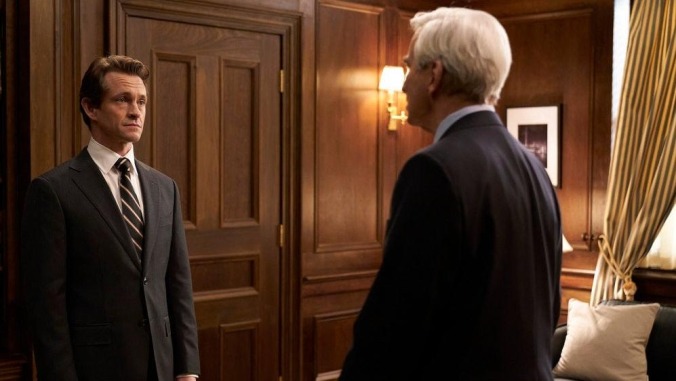Law & Order fails to do the right thing with disappointing Cosby-inspired episode
The season 21 premiere is such a mess, you’ll need to binge-watch past seasons as a palate cleanser.


The best Law & Order cold opens are like a minute-long, one-act play: A couple argues about an upcoming visit from in-laws; construction workers talk about striking it rich in the lottery; some kids skip school to see a movie. We’re quickly pulled into their New York stories, and then… they find the body.
Law & Order’s season 21 premiere, “The Right Thing,” abandons the classic cold open format and focuses instead on the unsympathetic victim, Henry King (Norm Lewis), an obvious Bill Cosby stand-in. There’s no horrified discovery of the body or any mystery over motive. Detectives Kevin Bernard (Anthony Anderson) and Frank Cosgrove (Jeffrey Donovan) can head straight to the obvious suspects, the 40 women who King is accused of raping.
“The Right Thing” is the series’ 457th episode and at least 456 of those were better plotted. Classic Law & Order might’ve ripped stories from the headlines but the resolutions were never pedestrian. You might’ve safely assumed that King’s killer was anyone but one of his victims or that the murder would have nothing to do with his crimes. Unfortunately, it’s just that straightforward.
I briefly thought we might get a shocking twist worthy of Law & Order at its best: A woman caught on film arguing with King before he died is none other than Assistant District Attorney Jamie Ross (Carey Lowell), who starred on the show during its seventh and eighth seasons. Ross was lead prosecutor on Fox’s rape trial, and she fills in narratively for the Pennsylvania DA who offered Cosby immunity in exchange for his testimony in a civil case. She feels guilty because King’s conviction was vacated, and once released from prison, King vowed to destroy her. Did a fan favorite character kill King? No, of course not. That might’ve been interesting.
When the detectives speak with Ross, Cosgrove asks her point blank if she killed King because she screwed up the case against him. This is blunt-force interrogation that only works on bad cop shows, which Law & Order never was. He doesn’t subtly ask where she was when King was murdered. He just insults her and she promptly throws them out of her office. That’s some solid police work, Frank.
This whole episode is a master class in “How To Make Audiences Hate Your New Character.” Cosgrove is an insensitive jerk to someone longtime viewers know and like. Earlier, he gets pissed off when people whip out their phones when he’s aggressive with a Black witness. He whines that because he’s white, if he says or does the wrong thing, his career is over. Statistically, he has a better chance of getting struck by lightning twice in the same spot than he does of getting fired because he pushed around a Black kid.
What passes for a conflict in the episode hinges around a confession Cosgrove coerces from the killer. He flat-out lies and claims no prosecutor would pursue a case against one of King’s victims. This is far different from when male detectives would play to a rapist’s arrogance and vanity or pretend to understand why a suspect killed his unfaithful wife. Cosgrove emotionally manipulates a rape victim, one who another man already violently betrayed. Maybe we could forgive Eddie Green for this a few seasons into his tenure, but it’s Cosgrove’s first episode. I hate this guy.
Law & Order has been accused of promoting “copaganda.” The show’s cops are depicted as noble and reasonable when their real-life brethren in the NYPD often aren’t. They are avengers, not enforcers. They don’t patrol the streets looking for petty crimes, even during the peak of Rudy Giuliani’s “broken windows” policies. We don’t see them stop and frisk random people of color. It’s unclear, though, if the returning series seeks to perhaps puncture this myth or has simply failed to create likable new characters. Where Det. Lennie Briscoe (Jerry Orbach) and Lt. Anita Van Buren (S. Epatha Merkerson) were personable with an endless supply of dry wit, Cosgrove and the detectives’ new supervisor Lt. Kate Dixon (Camryn Manheim) are stiff and distant. Past detectives were mostly relatable as working-class stiffs who did their job every day without complaint or any expectation of glory. Cosgrove and Dixon have visible contempt for a seemingly ungrateful public and are suspicious of anyone outside the force, even the prosecutors.
This becomes an issue when Executive Assistant DA Nolan Price (Hugh Dancy) chooses not to use Cosgrove’s corrupt confession, even though DA Jack McCoy (Sam Waterston) points out that it’s perfectly legal for cops to lie. Price is apparently one of those “progressive crusader” DAs that Dixon resents. There’s no clever legal maneuvering here, as the killer’s defense is effectively “I didn’t do it.” In the past, the defense attorney might’ve gone for “not guilty by reason of mental defect” or a more plausible self-defense argument (her rapist is free and has sworn revenge against those who helped imprison him). We might’ve had a more compelling courtroom debate over whether confessions given without a lawyer present should count at all. Instead, the inevitable conviction feels completely unearned.
It’s absolutely mind-boggling that Law & Order’s first episode after a 12-year break features its so-called “progressive” prosecutor successfully convicting a broken woman who killed her rapist, a powerful man who escaped actual justice. Is that what anyone wants to see? McCoy and his predecessor Ben Stone (Michael Moriarty) and McCoy convicted serial rapists and racist murderers. They went after the mob and the gun manufacturers. Former cast members referred to each episode’s conviction as “killing the bull.” I’d rather have seen a fictional Cosby definitively answer for his crimes.
The episode closes with Price and ADA Samantha Maroun (Odelya Halevi) feeling conflicted over their legal victory. Price gives a short speech that invokes the episode title and then stares wistfully at the courthouse. It’s a blah ending to a blah episode that only superficially resembles the series I love.
Stray Observations
- S. Epatha Merkerson is a regular on Dick Wolf’s other series, Chicago Med, so she couldn’t return as Lt. Van Buren. Her absence leaves a gaping hole in series that feels even larger than when Jerry Orbach quit in 2004 for health reasons. That’s probably because Camryn Manheim’s Dixon is absolutely dreadful. Her approach to the character reminds me of the Seinfeld episode where George Constanza explains how you can convince coworkers you’re busy by looking annoyed all the time.
- Ross left the DA’s office to work as defense attorney. She was last seen as a judge in Law & Order: Trial By Jury. It’s not clear when and why she became a prosecutor again.
- Not-so-minor quibble: A separate prosecutor ignored the deal a previous DA made with Cosby. Here, Ross makes the deal in good faith and then changes her mind after more victims come forward. No wonder the conviction was vacated. It’s a miracle Ross still has her license.
- “The Right Thing” pretty much ignores the racial issues surrounding the Cosby case.
- I pity Det. Bernard having to work with two obvious Trump supporters.
- I’ve had nothing positive to say about Frank Cosgrove, so this might seem especially petty: But not even the guy’s name works. “Mike Logan,” “Lennie Briscoe,” “Rey Curtis,” “Ed Green” were all descriptive and fitting of their characters. They said “New York detective,” while Frank Cosgrove sounds like a mad scientist.
- I’m disappointed that Jack McCoy would buy the “defund” hysteria. In reality, the New York City police budget increased last year. The homicide department certainly never lacked for resources. The closest the police came to “defunding” was when all municipal budgets faced cuts because of COVID-19. New York public schools were hit hard.